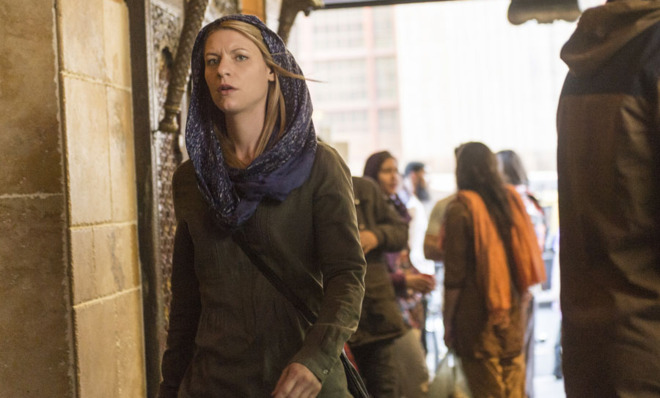The maddening almost-greatness of Homeland
As its fourth season begins, the Showtime drama moves in a promising new direction — then totally blows it in episode two


A free daily email with the biggest news stories of the day – and the best features from TheWeek.com
You are now subscribed
Your newsletter sign-up was successful
In some better, alternate TV universe, Homeland's first season ended the way it always should have: with Nicolas Brody blowing up himself, the vice president, and a large portion of the State Department.
Unfortunately, that didn't happen. Maybe it was a miscalculation about Brody's value to the overarching narrative. Maybe it was a lack of boldness. But Homeland painfully dragged out Brody's story for two more mostly subpar seasons. While those seasons did include some of the best episodes of the series, they also resulted in a draggy, increasingly implausible story, held back by the show's slavish devotion to documenting everything happening to Brody and his family. As Homeland stayed fixated on Brody, it kept Carrie Mathison, the CIA, and the show's viewers from exploring everything that was actually interesting about the show.
Homeland's third season ended with Brody's death, which makes season four a quasi-reboot (with Franny, Carrie's daughter with Brody, living on as a kind of vestigial tail). As season four begins, Carrie has taken a post abroad. She's affectionately known as "The Drone Queen" in her office in Kabul, leading a team as they take out foreign targets in a series of precision strikes. But a bad piece of intel leads to the bombing of a wedding party, resulting in widespread outrage and protests that only grow louder when a viral video depicting the attack is leaked onto the internet. By the end of the first episode, the station chief in Islamabad has been killed by a vengeful mob, and the United States is left scrambling for a response that will be both proportionate and politically savvy.
The Week
Escape your echo chamber. Get the facts behind the news, plus analysis from multiple perspectives.

Sign up for The Week's Free Newsletters
From our morning news briefing to a weekly Good News Newsletter, get the best of The Week delivered directly to your inbox.
From our morning news briefing to a weekly Good News Newsletter, get the best of The Week delivered directly to your inbox.
It was a confident start to what seemed like a promising new direction for the show: a nuanced depiction of American foreign policy, and the ripple effects a single, terrible mistake can have. Danes is as strong as ever in the lead role, and the new characters fit neatly into the show's overarching world (particularly the station chief played by Corey Stoll, a master at elevating otherwise mediocre TV dramas.) Finally, Homeland seemed like it was back on track, becoming the top-tier drama that was always buried somewhere in its DNA.
But as soon as the promising premiere ended last night, episode two began, and everything fell apart.
The second episode was an obvious, unwieldy trainwreck that displays a fundamental lack of trust in the audience's ability to pick up on even the least subtle of nuances without underlining them six or seven times. Carrie can't leave her baby and follow up on a lead without a long shot of her nanny staring in numb disappointment as she leaves the room. Peter Quinn can't just be troubled by what happened in Pakistan; he has to guzzle an entire bottle of vodka and toss the empty into a public pool. For a show that tackles the complexities of both foreign politics and human emotion, there's not a single action or line of dialogue that possesses more than one dimension. This type of one-the-nose storytelling isn't just an insult to the audience; it's a disservice to the actors, who are more than capable of playing nuanced if they're given anything nuanced to play.
The stark drop in quality between the two episodes is a microcosm of everything that's wrong with Homeland. This is a schizophrenic show: sometimes good, occasionally great — and frustratingly wrong-headed the rest of the time. I've seen the third episode of the season; it's not as impressive as the premiere, but much, much better than the second episode. If this was Homeland's first season, or second, or even its third, I'd be inclined to cut the show a little more slack. But I'm increasingly convinced that Homeland was never as smart as it seemed to be; that, like its tortured protagonist, it was simply maintaining a confident façade while desperately attempting to disguise that there was nothing but instability underneath. (A scathing Washington Post story documents the many lazy inaccuracies in the show's depiction of Islam and the Middle East.) It's too late in the game for a prestige drama to be so uneven — and, even more damning, to have failed to learn from the mistakes of its earlier seasons.
A free daily email with the biggest news stories of the day – and the best features from TheWeek.com
The show's unevenness is particularly maddening because we need a smart drama that honestly grapples with the state of contemporary American foreign policy. Homeland certainly looks the part: a terrific cast, sky-high production values, a plum Sunday timeslot on a premium network, and a slew of major Emmys on its shelf. It may even become that show someday — but until then, viewers will need to grit our teeth through the rough patches or tune out altogether.
Scott Meslow is the entertainment editor for TheWeek.com. He has written about film and television at publications including The Atlantic, POLITICO Magazine, and Vulture.
